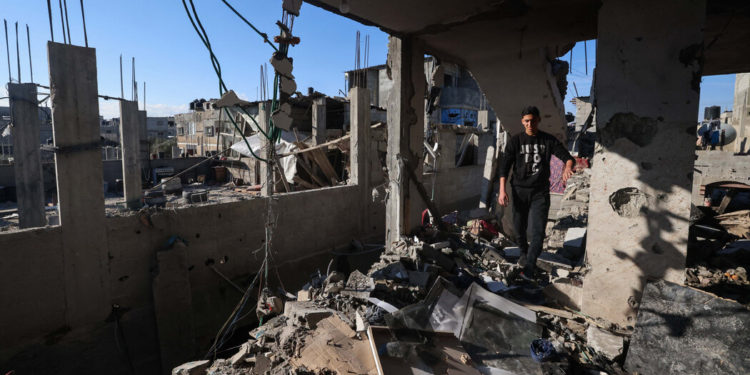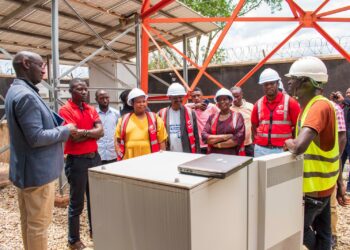By THE NEW YORK TIMES
Just a few hours before sunset in mid-March, World Central Kitchen workers scrambled to put the final touches on a makeshift jetty built out of rubble, as the ship carrying the first aid to reach the Gaza Strip by sea in nearly two decades backed toward the shore.
The crew from the disaster relief nonprofit still had to cover the jetty’s sharp edges and poking rebar, reminders that the rubble used to build the structure in northern Gaza came from bombed buildings. Using square pieces of debris, they created a vertical concrete wall to meet the ship.
“Running any sort of construction project in Gaza at this current time has got a ridiculous amount of challenges,” said Sam Bloch, the director of emergency response for World Central Kitchen, which was founded by the renowned Spanish chef José Andrés. Mr. Bloch, who oversaw the building of the jetty and the arrival of the shipment, described the scene by phone from Oakland, Calif., after leaving Gaza.
The arrival of the ship, which had sailed from Cyprus after the aid was inspected there, marked a milestone in a venture that Western officials hope will play a part in easing the enclave’s food deprivation. The operation has been described as a pilot project for the broader opening of a maritime corridor to supply the territory.
Once the food was unloaded, it was distributed in Gaza by truck — including in the north, where experts say famine is imminent. International aid agencies have largely stopped operations in the area, citing Israeli restrictions, security issues and poor road conditions.
At least two attempts to deliver food aid to desperate Palestinians in northern Gaza have ended in bloodshed in recent weeks, with Palestinian and Israeli officials blaming each other for the deadly scenes.
The Israeli military helped World Central Kitchen’s operation, providing security and coordination, according to an Israeli official who requested anonymity to speak about a sensitive matter. Every step was carried out with permission from the Israeli military, Mr. Bloch said.
“It was a lot of stop and go,” he said, and progress “was definitely not consistent or predictable.”
The construction of the World Central Kitchen jetty took six days, with the job site sometimes running around the clock as the jetty slowly extended into the sea, one rubble-filled truck at a time. “Using rubble was a big challenge,” Mr. Bloch said, “but it is the only resource that is plentiful enough in Gaza at the moment.”
The rubble was brought mostly from southern Gaza, but also from around the work site. The head contractor, who had lost two of his homes to bombings about one mile away from the jetty, went with his dump trucks and heavy machinery to collect what remained of his destroyed homes, Mr. Bloch said.
Most of the construction equipment, including front-end loaders, dump trucks, flatbed trucks, cranes and a fuel truck, came from southern Gaza, Mr. Bloch said. But one piece of equipment, a movable light tower that allowed construction to continue through the night, had to be retrieved from a bombed-out warehouse in the north.
In coordination with the Israeli military, a small convoy, accompanied by heavy machinery to clear the roads, was sent to a warehouse in Gaza City, where local contractors had identified what they believed was the only light tower left in Gaza, Mr. Bloch said.
To unload the ship, which contained just under half a million meals, a large crane at the end of the jetty transferred food pallets onto eighteen-wheeler trucks that had been carefully backed down the jetty.
By the time the shipment was unloaded, it was nearing midnight. World Central Kitchen decided to send the trucks to a warehouse in Deir al Balah, a few miles south of the jetty, and distribute the aid during daylight hours.
A few days later, the trucks moved up Salah al-Din road, the main artery through central Gaza, to the southern edge of Gaza City, where hungry families collected food directly off the trucks. Nobody was hurt during the distribution, according to Mr. Bloch.
In the future, World Central Kitchen hopes to speed up the process by sending food directly from the jetty to communities in northern Gaza, Mr. Bloch said. The organization is also working to develop community kitchens that will serve as distribution points.
Building community kitchens is the bread and butter of World Central Kitchen. The group already has 68 in southern Gaza that provide most of the hot meals to civilians there, Mr. Bloch said.
World Central Kitchen has loaded a larger ship in Cyprus that, as of Monday, was still waiting for the right weather conditions before departing for Gaza.







Discussion about this post